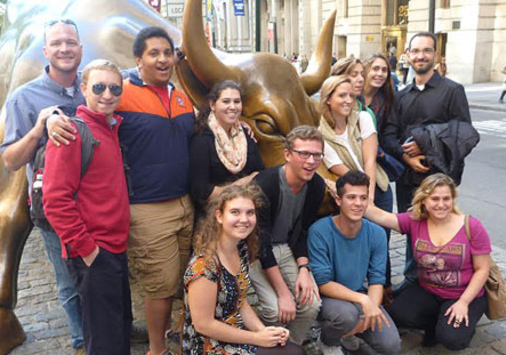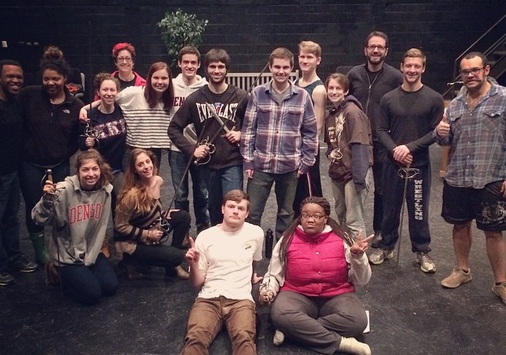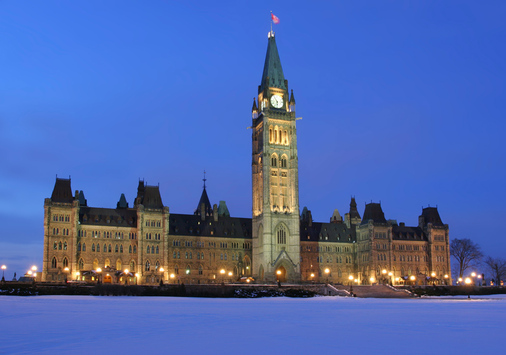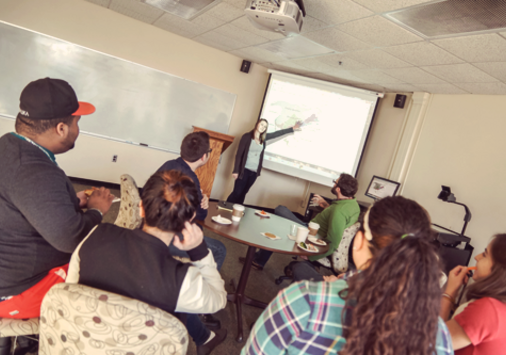Examples of Past Courses
Creating Musical Theatre: is a workshop course that will explore the relationship between music (both instrumental and with lyrics) and theatre (the live presentation of drama) in the creation of short form musical theatre works. The course will involve the investigation and discussion of significant concepts and theories regarding musical composition, playwriting, and lyric writing. Students will read, view, and listen to assigned texts, videos, and recordings for the purpose of thoughtful, nuanced critical discussion. Students will complete weekly written analytical, critical, and creative assignments, the majority of which will be collaborative group projects, and will be expected to engage in respectful but incisive critical analysis of each other’s work. The final project for the course will be the creation of a short but complete work of musical theatre. Taught by Ching-chu Hu and Peter Pauzé, Music and Theatre.
The Culture and Biomechanics of the Martial Arts: Broadly described, this laboratory/lecture course is an exploration of the intersection between the cultural and performative aspects of two East Asian martial arts (aikido and karate), and human biomechanics. Ultimately we hope that guiding students through practice of basic martial techniques in two different Japanese systems will enable them to gain an appreciation for the multi-faceted physical and socio-cultural complexities of martial arts. Through physical practice and classroom activities, students will explore the cultural bases for martial arts focus on the importance of processes (in addition to results); the importance of Confucianism (communal mentality, instructors lineage, etiquette as an expression of hierarchy, etc.); and, the connection between mind and body. Taught by Michael Tangeman and Eric Winters, Modern Languages and Health, Exercise & Sport Studies.
Divided Cities in Film and History: This course explores the historical and aesthetic experience of urban division in the European context. The course examines three cases in detail: Berlin, Germany; Belfast, Northern Ireland; and Nicosia, Cyprus; each of these cities has been the focal point of political, cultural, and geographic rupture. Through the lenses of film and history, the course investigates the ways in which political antagonisms impose their will on aesthetics and collective memory. Taught by Cathy Dollard and Dave Bussan, History and Cinema.
Ecolo-nomics: Compare and contrast ecology and economics in the context of a growing population, rising economic affluence and social disparities, and increased reliance and impact of the human species on natural resources. We will ask whether human economies exist within an ecological context, if these disciplines partially overlap, or if they are truly separate, devoid of theoretical homology. To inform our analysis, we will draw equally on the writings of ecological and economic scholars. Taught by David Goodwin and Quentin Duroy, Geosciences and Economics
Neighbor to the North: Arts, Culture, History and Politics in Canada:
Canada is our largest trading partner and the U.S.-Canada share the longest undefended border in the world. Yet Americans know little about Canada and what we think we know is more complex than it appears at first glance (Canadians, on average, love their health care system, for example). This course combines arts, politics and history across an entire year with in-class work, a trip to Canada and a research project that will enhance our understanding of our neighbor to the north. (3 credits in fall, two weeks in Canada over winter break, and 1 credit in spring) Taught by Sue Davis and Joanna Grabski, Political Science and Visual Culture.
Religion and Democracy: Is democracy compatible with religion? Taking the vantage point of philosophers, judges, and legal scholars, and empirical social scientists from a variety of disciplines, we will ask how religion contributes to good and democratic societies and how democracies create space for religious actors. We will travel to Washington DC over fall break to interview religious advocates and others about their experiences. Taught by Paul Djupe, Political Science.
The Renaissance of Psychoanalytic Thought: Studying Freud in the 21st Century: The study of Freud’s work has not lost its seminal relevance and importance across the academic disciplines. In this course we will study Freud both as a scientist and humanist, and will make connections to new advances in contemporary neuroscience and humanistic ideas alike. Thus the course is relevant to students across all disciplines. Students with intermediate level German skills have the opportunity to study some readings in the German language in a separate 2 credit directed study module. Taught by Gabrielle Dillmann, Modern Languages.
Shakespeare by the Sword: Students will train in fencing and stage combat through an active consideration of a number of Shakespeare's plays. Additionally, students will engage with acting and writing techniques that imagine dramatic interactions in fencing's terms. Ample class time will be afforded to on-our-feet exercises to guarantee that you'll be able to fight for love and honor, in iambic pentameter, before winter break! Taught by Peter Grandbois and Cheryl McFarren, English and Theatre.










